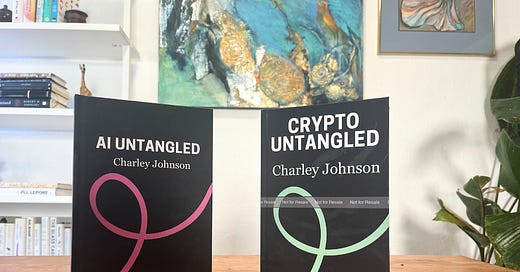Let’s recap 2024, shall we?
I published two books — AI Untangled & Crypto Untangled. You can buy them here:
I launched Untangled Live! and my first course, Sociotechnical Systems Change in Practice to help you transform power dynamics in the systems you’re in, and chart new sociotechnical futures. (Registration will close January 8.)
I built a personal website that ties all of my work together. Come for all the offerings — coaching, advising, facilitation, and courses — and stay for the pug pictures.
I launched a new partnership with
, a former NPR reporter and award-winning nonfiction author. Now, when you sign up for an annual paid subscription to Untangled, you’ll get free access to the paid version of Anya’s newsletter, The Golden Hour. Check out our conversation about the partnership and the work ahead.Speaking of podcasts, I hosted a number of great expert conversations, including:
I spoke with
, the creator of Unfollow Everything, about the tool that could change the internet as we know it.I spoke with Tamara Kneese about her new book Death Glitch: How Techno-Solutionism Fails Us in This Life and Beyond.
I spoke with
about whether AI can help us grieve.I spoke with
about why AI needs a new philosophy of product development.I spoke with Shannon Vallor about her great new book The AI Mirror: Reclaiming Our Humanity in an Age of Machine Thinking.
I spoke with
about his fascinating and funny new podcast about AI agents, Shell Game.I spoke with AI reporter Karen Hao about OpenAI’s mythology, Meta’s secret, and Microsoft’s hypocrisy.
I spoke with
and Nik Marda about the potential of public AI.I spoke with
about his great new book with , AI Snake Oil: What Artificial Intelligence Can Do, What it Can’t, and How to Tell the Difference.I spoke with Deepti Doshi, Co-Director of
, about building healthy local communities, online and off.I spoke with Divya Siddarth, Co-Founder & Executive Director of the Collective Intelligence Project about how we might democratize the development and governance of AI.
Without further adieu, let’s take a walk down memory lane of Untangled’s Top 5 essays of 2024.
Untangled’s Top 5 Essays of 2024
5. In crypto, everyone is a ponzi…until sometimes, it’s not.
Imagine if Uber built its driver network by offering drivers ‘Uber Tokens.’ Imagine further that these tokens functioned like equity, giving drivers a stake in the future value of the network. This is the promise of a new category of crypto project — ‘DePin’ or Decentralized Physical Infrastructure — that intends to use token incentives to overcome the ‘cold-start problem’ inherent to a two-sided physical or virtual infrastructure network.
It’s a story about how everything is a ponzi in crypto, until sometimes, it’s not.
4. If the medium is the message, what is the message of AI?
Marshall McLuhan famously argued that the medium matters more than the content it carries: the medium is the message. E.g. TV has made all news into entertainment. Or, social media has turned everyone into a content creator, and everything into a collective performance of the crowd. So what’s the message of generative AI? As Ezra Klein rightly suggests, it is that humans are replaceable.
But we’re not, actually. Vaughn Tan, professor at University College London’s School of Management, argues that we’re posing the wrong question as a society. We’re asking, ‘Can AI systems produce outputs that look like human outputs?’ when a more discriminating question would be: ‘what can humans do that AI systems cannot?’
This essay starts to answer that question.
3. An AI model will take your place when you die
AI chatbots are being used by people to chat with synthetic versions of their exes — and, the dead. People are training AI chatbots — let’s call these ‘GriefBots’ — on the digital footprints of the deceased, and then conversing with them. How might this phenomenon alter the grieving process and our ability to move forward?
Read this answer to find out!
2. Transcend your meat prison
I’ve written a lot of words about how we anthropomorphize AI, and why it’s a big problem. But the opposite is just as true and problematic: we’re increasingly molding ourselves to AI in pursuit of a disembodied perfection, even transcendence. Along the way, we’re giving up our agency to build better worlds.
The essay ends with this call to action:
“The pursuit of disembodied perfectionism — via a mathematically rationalist mind and technological transcendence — offers an escape from our present, earthly context. In a world that wants uncritical acceptance of technological pursuits, asking ‘why’ is a radical act. In a world that rewards and privileges disembodied perfectionism, embodied imperfection is a radical way of being. In a world that wants technological transcendence, a life lived right now, in service of others, is a radical life. Part of the problem here is that what’s considered radical has shifted to suit new norms — so if all of a sudden we valued human intelligence, whimsy, embodiment, uncertainty, and service to others over machine replicas, what radical future worlds would you want to build?”
1. How do we work our way towards utopia?
In the summer of 1956, a group of 47 AI pioneers were invited to Dartmouth College to discuss the future of AI. All were men. All were white. And the vast majority were expert in math and computers, not the social systems their technologies would ultimately become entangled in. We’re now living in a world partially inspired by their imaginative inquiry — their version of utopian thinking got us into this mess. Getting out of it will require a very different approach.
This essay describes what such an approach might look like. Hint: it requires thinking backward from alternative futures!
Okay, that’s a wrap on 2024. See you in 2025!
Charley









